Legal Environment of Business: Case Study and Judgement Report
VerifiedAdded on 2022/01/13
|18
|7118
|112
Report
AI Summary
This report, prepared by students of the University of Dhaka's Department of Finance, presents an analysis of several case studies within the context of the legal environment of business. The report begins with an introduction to mercantile law and outlines the objectives, methodology, and limitations of the study. The core of the report comprises detailed case overviews, exploring scenarios involving contracts, offers, and legal judgments. Each case is examined in light of relevant laws and legal principles, with references to specific sections of the law. The report includes discussions on issues such as breach of contract, undue influence, and the validity of agreements, providing a comprehensive understanding of the legal implications in various business transactions. The report concludes with a summary of findings and a bibliography of sources used, demonstrating a thorough approach to the subject matter.
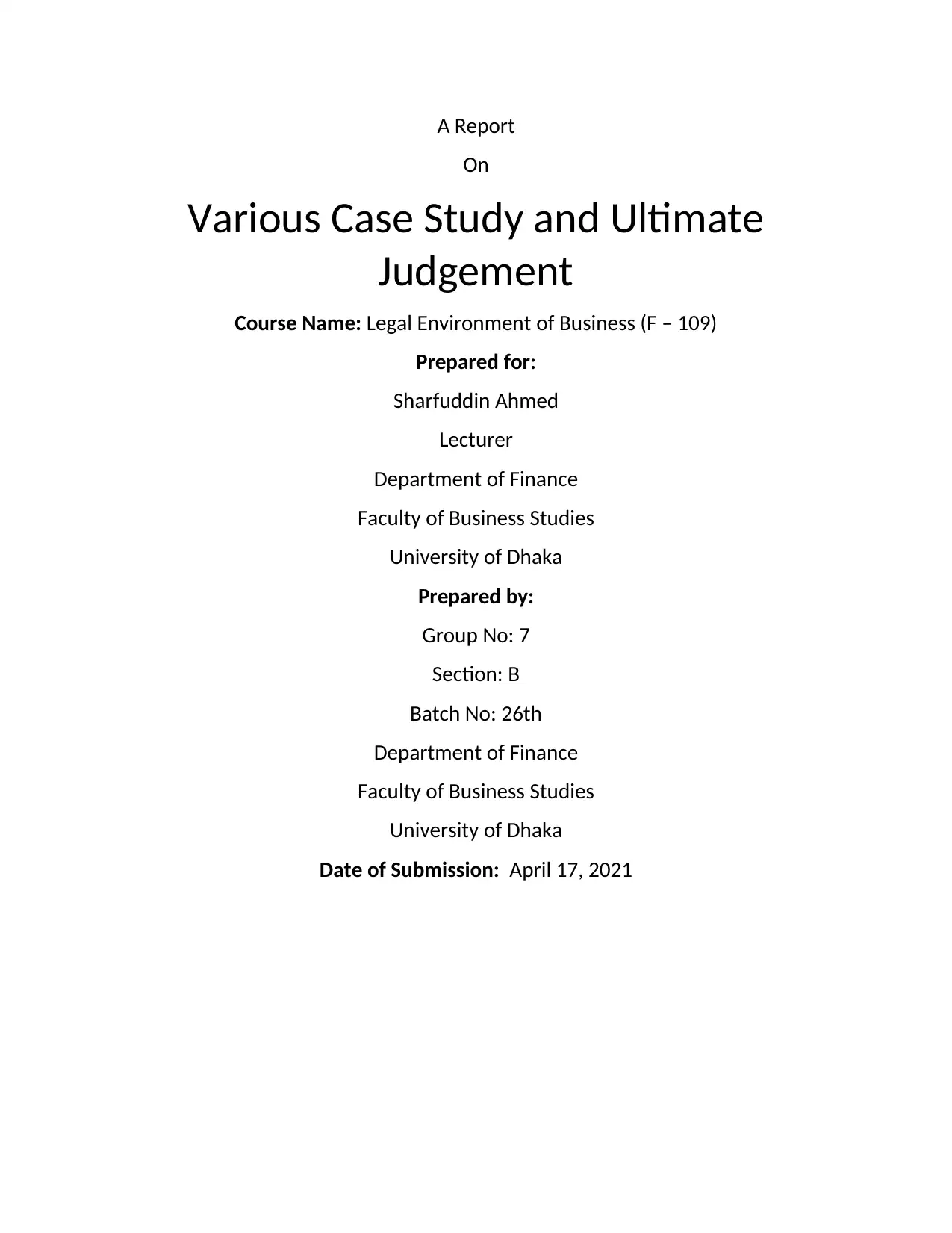
A Report
On
Various Case Study and Ultimate
Judgement
Course Name: Legal Environment of Business (F – 109)
Prepared for:
Sharfuddin Ahmed
Lecturer
Department of Finance
Faculty of Business Studies
University of Dhaka
Prepared by:
Group No: 7
Section: B
Batch No: 26th
Department of Finance
Faculty of Business Studies
University of Dhaka
Date of Submission: April 17, 2021
On
Various Case Study and Ultimate
Judgement
Course Name: Legal Environment of Business (F – 109)
Prepared for:
Sharfuddin Ahmed
Lecturer
Department of Finance
Faculty of Business Studies
University of Dhaka
Prepared by:
Group No: 7
Section: B
Batch No: 26th
Department of Finance
Faculty of Business Studies
University of Dhaka
Date of Submission: April 17, 2021
Paraphrase This Document
Need a fresh take? Get an instant paraphrase of this document with our AI Paraphraser
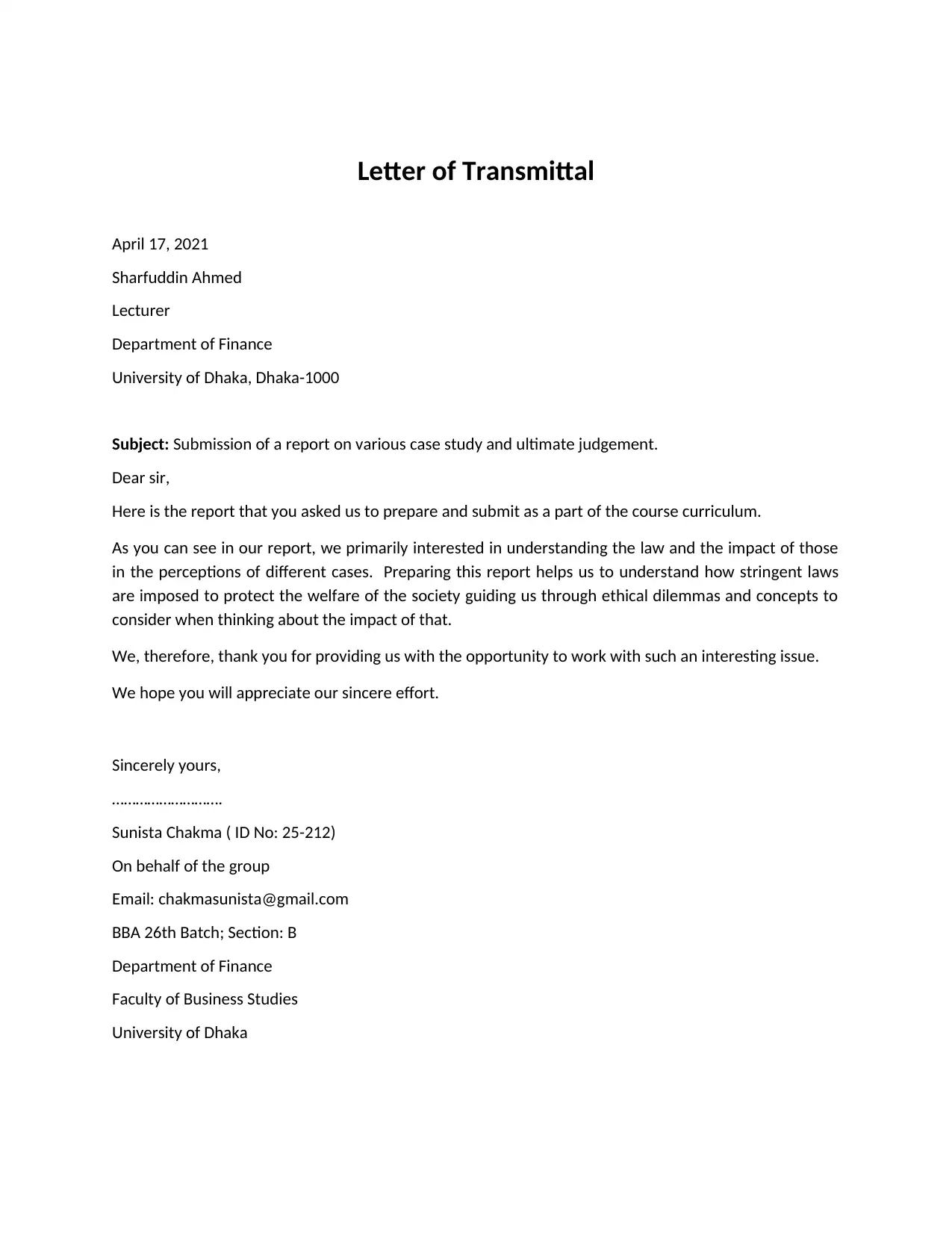
Letter of Transmittal
April 17, 2021
Sharfuddin Ahmed
Lecturer
Department of Finance
University of Dhaka, Dhaka-1000
Subject: Submission of a report on various case study and ultimate judgement.
Dear sir,
Here is the report that you asked us to prepare and submit as a part of the course curriculum.
As you can see in our report, we primarily interested in understanding the law and the impact of those
in the perceptions of different cases. Preparing this report helps us to understand how stringent laws
are imposed to protect the welfare of the society guiding us through ethical dilemmas and concepts to
consider when thinking about the impact of that.
We, therefore, thank you for providing us with the opportunity to work with such an interesting issue.
We hope you will appreciate our sincere effort.
Sincerely yours,
……………………….
Sunista Chakma ( ID No: 25-212)
On behalf of the group
Email: chakmasunista@gmail.com
BBA 26th Batch; Section: B
Department of Finance
Faculty of Business Studies
University of Dhaka
April 17, 2021
Sharfuddin Ahmed
Lecturer
Department of Finance
University of Dhaka, Dhaka-1000
Subject: Submission of a report on various case study and ultimate judgement.
Dear sir,
Here is the report that you asked us to prepare and submit as a part of the course curriculum.
As you can see in our report, we primarily interested in understanding the law and the impact of those
in the perceptions of different cases. Preparing this report helps us to understand how stringent laws
are imposed to protect the welfare of the society guiding us through ethical dilemmas and concepts to
consider when thinking about the impact of that.
We, therefore, thank you for providing us with the opportunity to work with such an interesting issue.
We hope you will appreciate our sincere effort.
Sincerely yours,
……………………….
Sunista Chakma ( ID No: 25-212)
On behalf of the group
Email: chakmasunista@gmail.com
BBA 26th Batch; Section: B
Department of Finance
Faculty of Business Studies
University of Dhaka
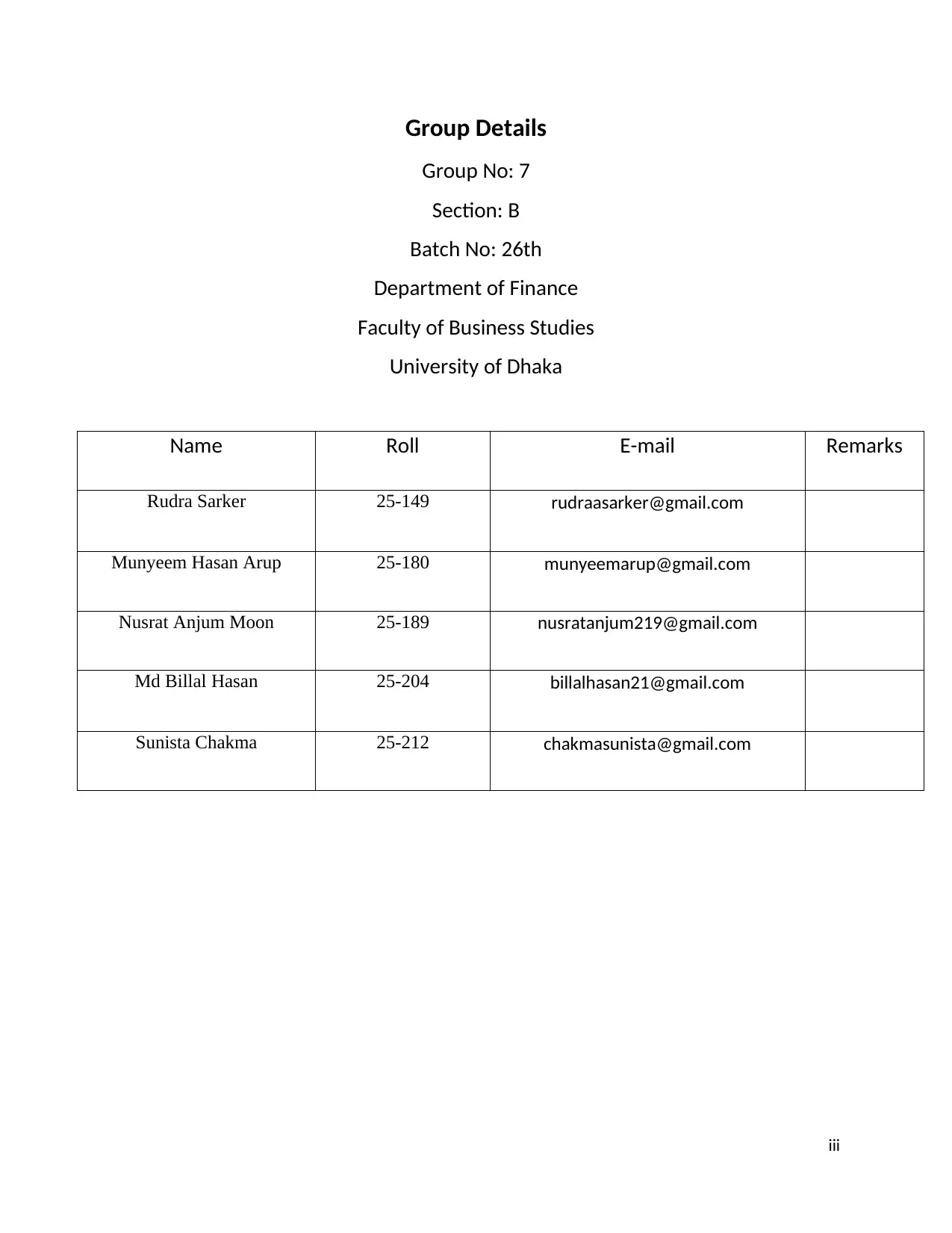
Group Details
Group No: 7
Section: B
Batch No: 26th
Department of Finance
Faculty of Business Studies
University of Dhaka
Name Roll E-mail Remarks
Rudra Sarker 25-149 rudraasarker@gmail.com
Munyeem Hasan Arup 25-180 munyeemarup@gmail.com
Nusrat Anjum Moon 25-189 nusratanjum219@gmail.com
Md Billal Hasan 25-204 billalhasan21@gmail.com
Sunista Chakma 25-212 chakmasunista@gmail.com
iii
Group No: 7
Section: B
Batch No: 26th
Department of Finance
Faculty of Business Studies
University of Dhaka
Name Roll E-mail Remarks
Rudra Sarker 25-149 rudraasarker@gmail.com
Munyeem Hasan Arup 25-180 munyeemarup@gmail.com
Nusrat Anjum Moon 25-189 nusratanjum219@gmail.com
Md Billal Hasan 25-204 billalhasan21@gmail.com
Sunista Chakma 25-212 chakmasunista@gmail.com
iii
⊘ This is a preview!⊘
Do you want full access?
Subscribe today to unlock all pages.

Trusted by 1+ million students worldwide
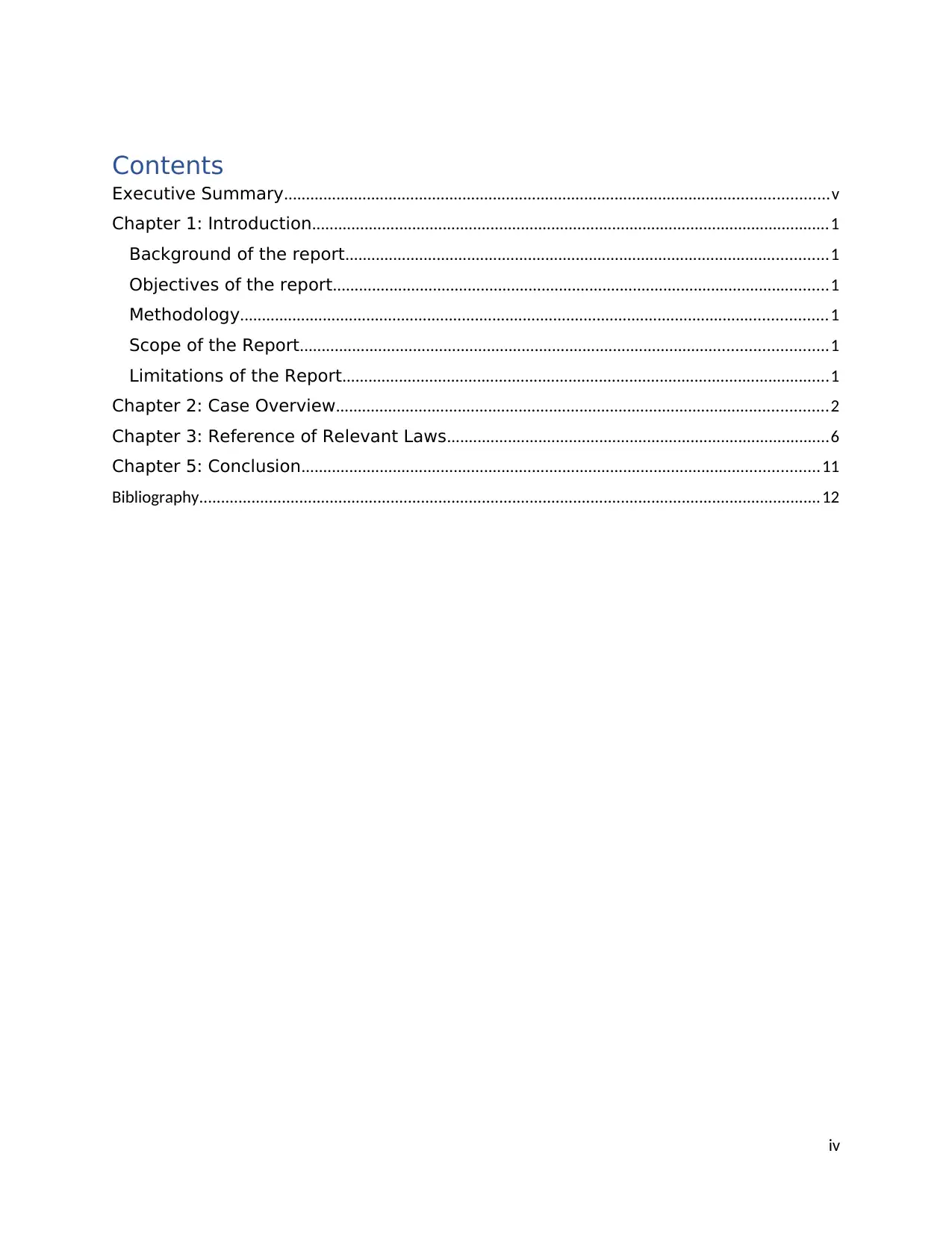
Contents
Executive Summary.............................................................................................................................v
Chapter 1: Introduction.......................................................................................................................1
Background of the report...............................................................................................................1
Objectives of the report..................................................................................................................1
Methodology.......................................................................................................................................1
Scope of the Report.........................................................................................................................1
Limitations of the Report................................................................................................................1
Chapter 2: Case Overview.................................................................................................................2
Chapter 3: Reference of Relevant Laws........................................................................................6
Chapter 5: Conclusion.......................................................................................................................11
Bibliography...............................................................................................................................................12
iv
Executive Summary.............................................................................................................................v
Chapter 1: Introduction.......................................................................................................................1
Background of the report...............................................................................................................1
Objectives of the report..................................................................................................................1
Methodology.......................................................................................................................................1
Scope of the Report.........................................................................................................................1
Limitations of the Report................................................................................................................1
Chapter 2: Case Overview.................................................................................................................2
Chapter 3: Reference of Relevant Laws........................................................................................6
Chapter 5: Conclusion.......................................................................................................................11
Bibliography...............................................................................................................................................12
iv
Paraphrase This Document
Need a fresh take? Get an instant paraphrase of this document with our AI Paraphraser
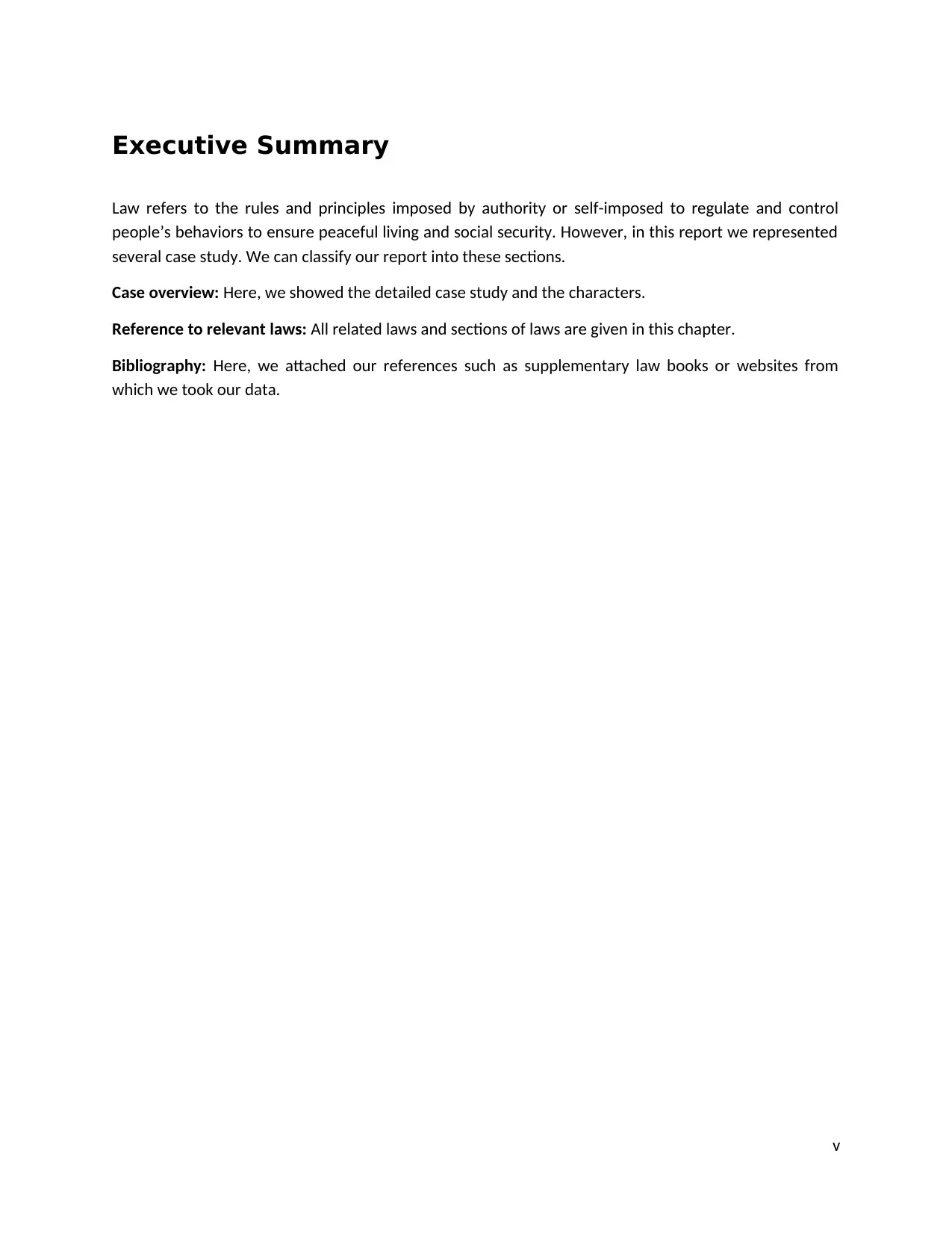
Executive Summary
Law refers to the rules and principles imposed by authority or self-imposed to regulate and control
people’s behaviors to ensure peaceful living and social security. However, in this report we represented
several case study. We can classify our report into these sections.
Case overview: Here, we showed the detailed case study and the characters.
Reference to relevant laws: All related laws and sections of laws are given in this chapter.
Bibliography: Here, we attached our references such as supplementary law books or websites from
which we took our data.
v
Law refers to the rules and principles imposed by authority or self-imposed to regulate and control
people’s behaviors to ensure peaceful living and social security. However, in this report we represented
several case study. We can classify our report into these sections.
Case overview: Here, we showed the detailed case study and the characters.
Reference to relevant laws: All related laws and sections of laws are given in this chapter.
Bibliography: Here, we attached our references such as supplementary law books or websites from
which we took our data.
v
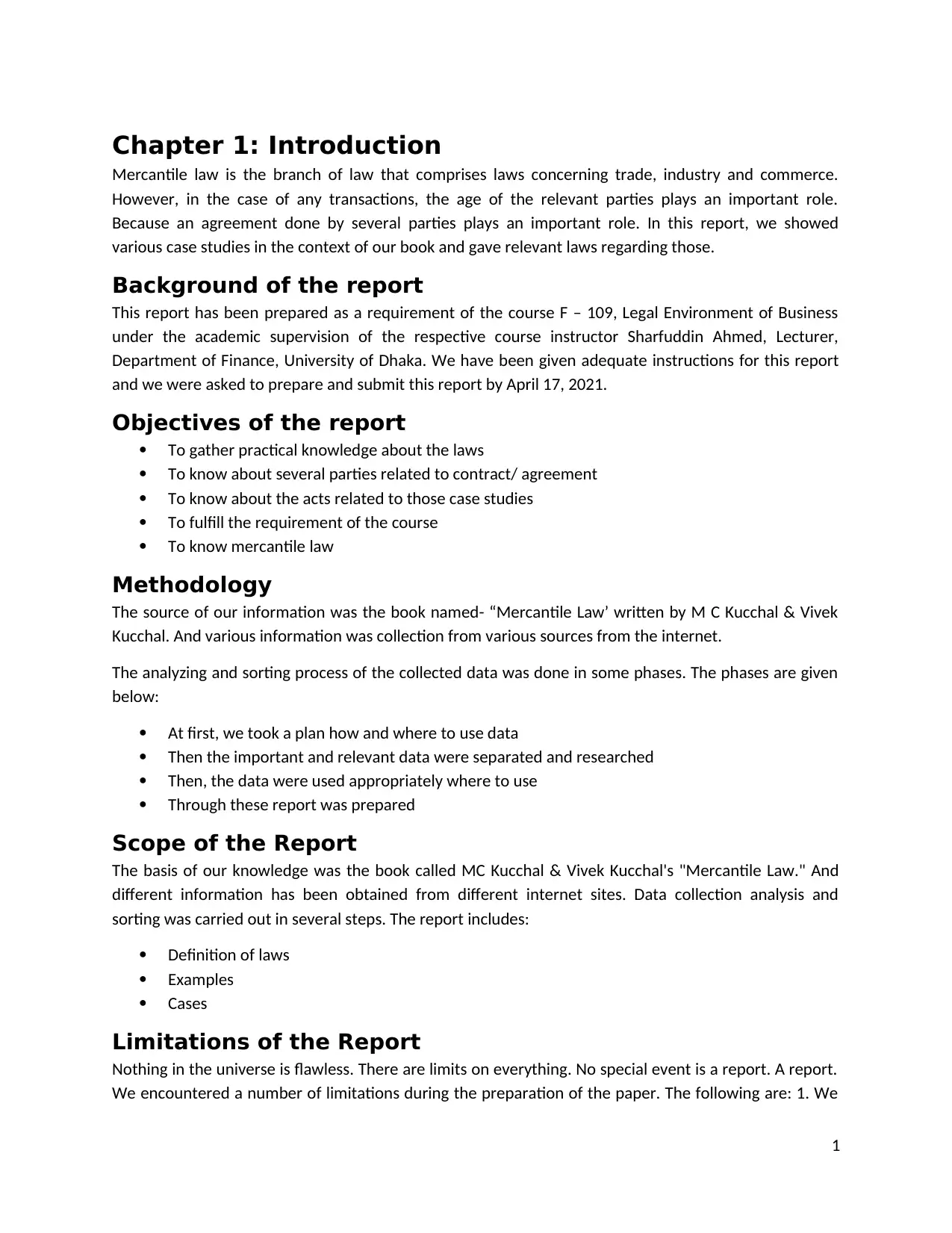
Chapter 1: Introduction
Mercantile law is the branch of law that comprises laws concerning trade, industry and commerce.
However, in the case of any transactions, the age of the relevant parties plays an important role.
Because an agreement done by several parties plays an important role. In this report, we showed
various case studies in the context of our book and gave relevant laws regarding those.
Background of the report
This report has been prepared as a requirement of the course F – 109, Legal Environment of Business
under the academic supervision of the respective course instructor Sharfuddin Ahmed, Lecturer,
Department of Finance, University of Dhaka. We have been given adequate instructions for this report
and we were asked to prepare and submit this report by April 17, 2021.
Objectives of the report
To gather practical knowledge about the laws
To know about several parties related to contract/ agreement
To know about the acts related to those case studies
To fulfill the requirement of the course
To know mercantile law
Methodology
The source of our information was the book named- “Mercantile Law’ written by M C Kucchal & Vivek
Kucchal. And various information was collection from various sources from the internet.
The analyzing and sorting process of the collected data was done in some phases. The phases are given
below:
At first, we took a plan how and where to use data
Then the important and relevant data were separated and researched
Then, the data were used appropriately where to use
Through these report was prepared
Scope of the Report
The basis of our knowledge was the book called MC Kucchal & Vivek Kucchal's "Mercantile Law." And
different information has been obtained from different internet sites. Data collection analysis and
sorting was carried out in several steps. The report includes:
Definition of laws
Examples
Cases
Limitations of the Report
Nothing in the universe is flawless. There are limits on everything. No special event is a report. A report.
We encountered a number of limitations during the preparation of the paper. The following are: 1. We
1
Mercantile law is the branch of law that comprises laws concerning trade, industry and commerce.
However, in the case of any transactions, the age of the relevant parties plays an important role.
Because an agreement done by several parties plays an important role. In this report, we showed
various case studies in the context of our book and gave relevant laws regarding those.
Background of the report
This report has been prepared as a requirement of the course F – 109, Legal Environment of Business
under the academic supervision of the respective course instructor Sharfuddin Ahmed, Lecturer,
Department of Finance, University of Dhaka. We have been given adequate instructions for this report
and we were asked to prepare and submit this report by April 17, 2021.
Objectives of the report
To gather practical knowledge about the laws
To know about several parties related to contract/ agreement
To know about the acts related to those case studies
To fulfill the requirement of the course
To know mercantile law
Methodology
The source of our information was the book named- “Mercantile Law’ written by M C Kucchal & Vivek
Kucchal. And various information was collection from various sources from the internet.
The analyzing and sorting process of the collected data was done in some phases. The phases are given
below:
At first, we took a plan how and where to use data
Then the important and relevant data were separated and researched
Then, the data were used appropriately where to use
Through these report was prepared
Scope of the Report
The basis of our knowledge was the book called MC Kucchal & Vivek Kucchal's "Mercantile Law." And
different information has been obtained from different internet sites. Data collection analysis and
sorting was carried out in several steps. The report includes:
Definition of laws
Examples
Cases
Limitations of the Report
Nothing in the universe is flawless. There are limits on everything. No special event is a report. A report.
We encountered a number of limitations during the preparation of the paper. The following are: 1. We
1
⊘ This is a preview!⊘
Do you want full access?
Subscribe today to unlock all pages.

Trusted by 1+ million students worldwide
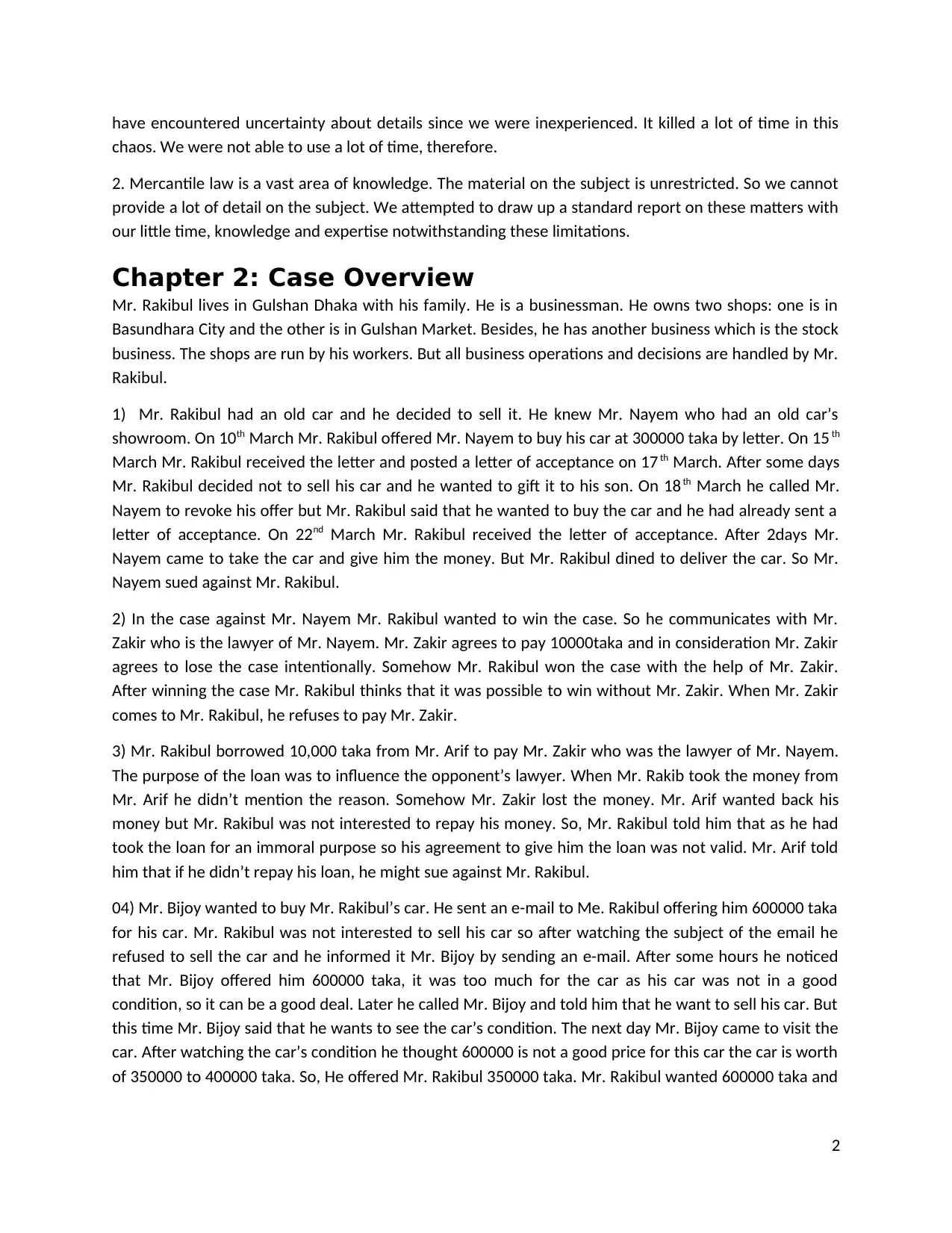
have encountered uncertainty about details since we were inexperienced. It killed a lot of time in this
chaos. We were not able to use a lot of time, therefore.
2. Mercantile law is a vast area of knowledge. The material on the subject is unrestricted. So we cannot
provide a lot of detail on the subject. We attempted to draw up a standard report on these matters with
our little time, knowledge and expertise notwithstanding these limitations.
Chapter 2: Case Overview
Mr. Rakibul lives in Gulshan Dhaka with his family. He is a businessman. He owns two shops: one is in
Basundhara City and the other is in Gulshan Market. Besides, he has another business which is the stock
business. The shops are run by his workers. But all business operations and decisions are handled by Mr.
Rakibul.
1) Mr. Rakibul had an old car and he decided to sell it. He knew Mr. Nayem who had an old car’s
showroom. On 10th March Mr. Rakibul offered Mr. Nayem to buy his car at 300000 taka by letter. On 15 th
March Mr. Rakibul received the letter and posted a letter of acceptance on 17 th March. After some days
Mr. Rakibul decided not to sell his car and he wanted to gift it to his son. On 18 th March he called Mr.
Nayem to revoke his offer but Mr. Rakibul said that he wanted to buy the car and he had already sent a
letter of acceptance. On 22nd March Mr. Rakibul received the letter of acceptance. After 2days Mr.
Nayem came to take the car and give him the money. But Mr. Rakibul dined to deliver the car. So Mr.
Nayem sued against Mr. Rakibul.
2) In the case against Mr. Nayem Mr. Rakibul wanted to win the case. So he communicates with Mr.
Zakir who is the lawyer of Mr. Nayem. Mr. Zakir agrees to pay 10000taka and in consideration Mr. Zakir
agrees to lose the case intentionally. Somehow Mr. Rakibul won the case with the help of Mr. Zakir.
After winning the case Mr. Rakibul thinks that it was possible to win without Mr. Zakir. When Mr. Zakir
comes to Mr. Rakibul, he refuses to pay Mr. Zakir.
3) Mr. Rakibul borrowed 10,000 taka from Mr. Arif to pay Mr. Zakir who was the lawyer of Mr. Nayem.
The purpose of the loan was to influence the opponent’s lawyer. When Mr. Rakib took the money from
Mr. Arif he didn’t mention the reason. Somehow Mr. Zakir lost the money. Mr. Arif wanted back his
money but Mr. Rakibul was not interested to repay his money. So, Mr. Rakibul told him that as he had
took the loan for an immoral purpose so his agreement to give him the loan was not valid. Mr. Arif told
him that if he didn’t repay his loan, he might sue against Mr. Rakibul.
04) Mr. Bijoy wanted to buy Mr. Rakibul’s car. He sent an e-mail to Me. Rakibul offering him 600000 taka
for his car. Mr. Rakibul was not interested to sell his car so after watching the subject of the email he
refused to sell the car and he informed it Mr. Bijoy by sending an e-mail. After some hours he noticed
that Mr. Bijoy offered him 600000 taka, it was too much for the car as his car was not in a good
condition, so it can be a good deal. Later he called Mr. Bijoy and told him that he want to sell his car. But
this time Mr. Bijoy said that he wants to see the car’s condition. The next day Mr. Bijoy came to visit the
car. After watching the car’s condition he thought 600000 is not a good price for this car the car is worth
of 350000 to 400000 taka. So, He offered Mr. Rakibul 350000 taka. Mr. Rakibul wanted 600000 taka and
2
chaos. We were not able to use a lot of time, therefore.
2. Mercantile law is a vast area of knowledge. The material on the subject is unrestricted. So we cannot
provide a lot of detail on the subject. We attempted to draw up a standard report on these matters with
our little time, knowledge and expertise notwithstanding these limitations.
Chapter 2: Case Overview
Mr. Rakibul lives in Gulshan Dhaka with his family. He is a businessman. He owns two shops: one is in
Basundhara City and the other is in Gulshan Market. Besides, he has another business which is the stock
business. The shops are run by his workers. But all business operations and decisions are handled by Mr.
Rakibul.
1) Mr. Rakibul had an old car and he decided to sell it. He knew Mr. Nayem who had an old car’s
showroom. On 10th March Mr. Rakibul offered Mr. Nayem to buy his car at 300000 taka by letter. On 15 th
March Mr. Rakibul received the letter and posted a letter of acceptance on 17 th March. After some days
Mr. Rakibul decided not to sell his car and he wanted to gift it to his son. On 18 th March he called Mr.
Nayem to revoke his offer but Mr. Rakibul said that he wanted to buy the car and he had already sent a
letter of acceptance. On 22nd March Mr. Rakibul received the letter of acceptance. After 2days Mr.
Nayem came to take the car and give him the money. But Mr. Rakibul dined to deliver the car. So Mr.
Nayem sued against Mr. Rakibul.
2) In the case against Mr. Nayem Mr. Rakibul wanted to win the case. So he communicates with Mr.
Zakir who is the lawyer of Mr. Nayem. Mr. Zakir agrees to pay 10000taka and in consideration Mr. Zakir
agrees to lose the case intentionally. Somehow Mr. Rakibul won the case with the help of Mr. Zakir.
After winning the case Mr. Rakibul thinks that it was possible to win without Mr. Zakir. When Mr. Zakir
comes to Mr. Rakibul, he refuses to pay Mr. Zakir.
3) Mr. Rakibul borrowed 10,000 taka from Mr. Arif to pay Mr. Zakir who was the lawyer of Mr. Nayem.
The purpose of the loan was to influence the opponent’s lawyer. When Mr. Rakib took the money from
Mr. Arif he didn’t mention the reason. Somehow Mr. Zakir lost the money. Mr. Arif wanted back his
money but Mr. Rakibul was not interested to repay his money. So, Mr. Rakibul told him that as he had
took the loan for an immoral purpose so his agreement to give him the loan was not valid. Mr. Arif told
him that if he didn’t repay his loan, he might sue against Mr. Rakibul.
04) Mr. Bijoy wanted to buy Mr. Rakibul’s car. He sent an e-mail to Me. Rakibul offering him 600000 taka
for his car. Mr. Rakibul was not interested to sell his car so after watching the subject of the email he
refused to sell the car and he informed it Mr. Bijoy by sending an e-mail. After some hours he noticed
that Mr. Bijoy offered him 600000 taka, it was too much for the car as his car was not in a good
condition, so it can be a good deal. Later he called Mr. Bijoy and told him that he want to sell his car. But
this time Mr. Bijoy said that he wants to see the car’s condition. The next day Mr. Bijoy came to visit the
car. After watching the car’s condition he thought 600000 is not a good price for this car the car is worth
of 350000 to 400000 taka. So, He offered Mr. Rakibul 350000 taka. Mr. Rakibul wanted 600000 taka and
2
Paraphrase This Document
Need a fresh take? Get an instant paraphrase of this document with our AI Paraphraser
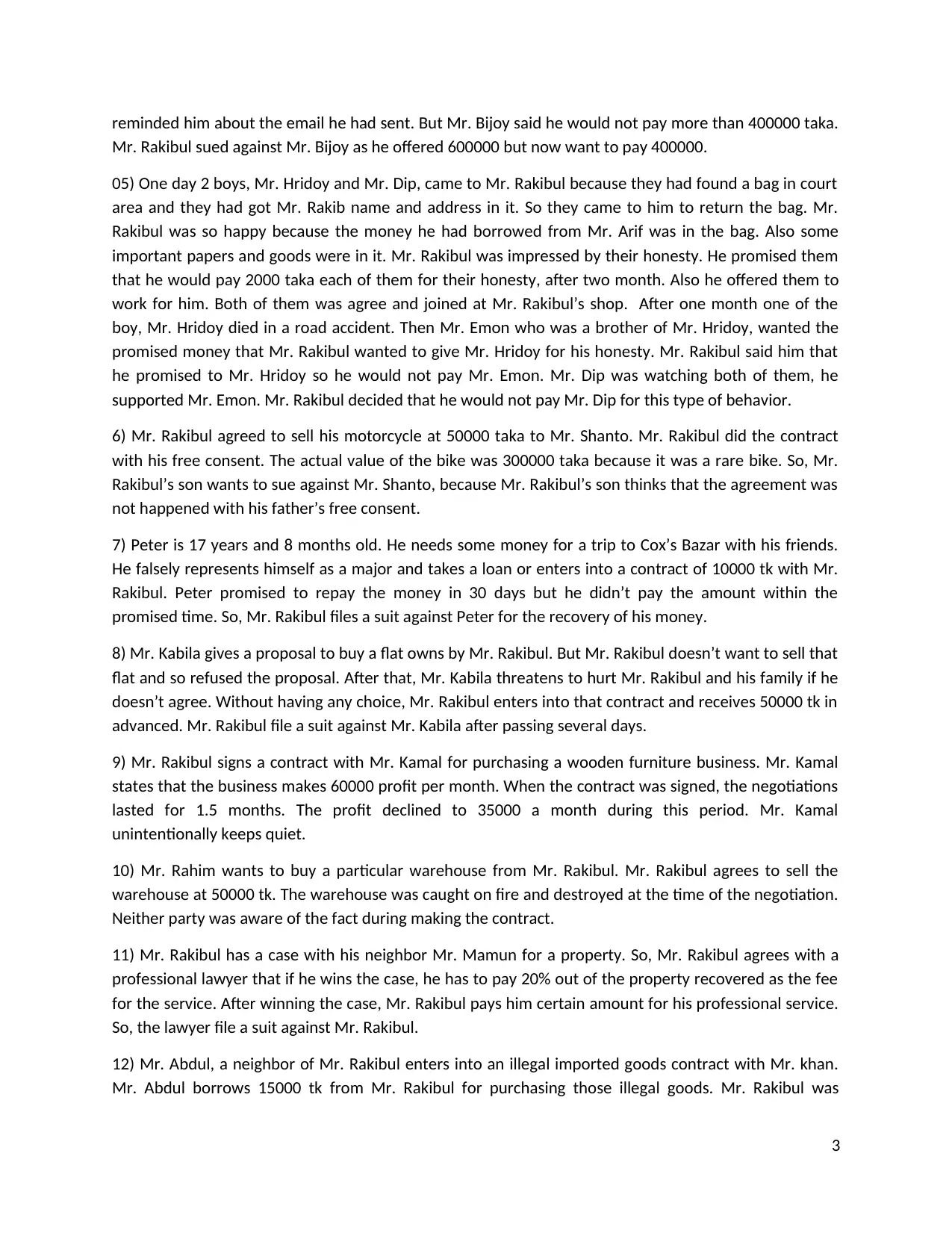
reminded him about the email he had sent. But Mr. Bijoy said he would not pay more than 400000 taka.
Mr. Rakibul sued against Mr. Bijoy as he offered 600000 but now want to pay 400000.
05) One day 2 boys, Mr. Hridoy and Mr. Dip, came to Mr. Rakibul because they had found a bag in court
area and they had got Mr. Rakib name and address in it. So they came to him to return the bag. Mr.
Rakibul was so happy because the money he had borrowed from Mr. Arif was in the bag. Also some
important papers and goods were in it. Mr. Rakibul was impressed by their honesty. He promised them
that he would pay 2000 taka each of them for their honesty, after two month. Also he offered them to
work for him. Both of them was agree and joined at Mr. Rakibul’s shop. After one month one of the
boy, Mr. Hridoy died in a road accident. Then Mr. Emon who was a brother of Mr. Hridoy, wanted the
promised money that Mr. Rakibul wanted to give Mr. Hridoy for his honesty. Mr. Rakibul said him that
he promised to Mr. Hridoy so he would not pay Mr. Emon. Mr. Dip was watching both of them, he
supported Mr. Emon. Mr. Rakibul decided that he would not pay Mr. Dip for this type of behavior.
6) Mr. Rakibul agreed to sell his motorcycle at 50000 taka to Mr. Shanto. Mr. Rakibul did the contract
with his free consent. The actual value of the bike was 300000 taka because it was a rare bike. So, Mr.
Rakibul’s son wants to sue against Mr. Shanto, because Mr. Rakibul’s son thinks that the agreement was
not happened with his father’s free consent.
7) Peter is 17 years and 8 months old. He needs some money for a trip to Cox’s Bazar with his friends.
He falsely represents himself as a major and takes a loan or enters into a contract of 10000 tk with Mr.
Rakibul. Peter promised to repay the money in 30 days but he didn’t pay the amount within the
promised time. So, Mr. Rakibul files a suit against Peter for the recovery of his money.
8) Mr. Kabila gives a proposal to buy a flat owns by Mr. Rakibul. But Mr. Rakibul doesn’t want to sell that
flat and so refused the proposal. After that, Mr. Kabila threatens to hurt Mr. Rakibul and his family if he
doesn’t agree. Without having any choice, Mr. Rakibul enters into that contract and receives 50000 tk in
advanced. Mr. Rakibul file a suit against Mr. Kabila after passing several days.
9) Mr. Rakibul signs a contract with Mr. Kamal for purchasing a wooden furniture business. Mr. Kamal
states that the business makes 60000 profit per month. When the contract was signed, the negotiations
lasted for 1.5 months. The profit declined to 35000 a month during this period. Mr. Kamal
unintentionally keeps quiet.
10) Mr. Rahim wants to buy a particular warehouse from Mr. Rakibul. Mr. Rakibul agrees to sell the
warehouse at 50000 tk. The warehouse was caught on fire and destroyed at the time of the negotiation.
Neither party was aware of the fact during making the contract.
11) Mr. Rakibul has a case with his neighbor Mr. Mamun for a property. So, Mr. Rakibul agrees with a
professional lawyer that if he wins the case, he has to pay 20% out of the property recovered as the fee
for the service. After winning the case, Mr. Rakibul pays him certain amount for his professional service.
So, the lawyer file a suit against Mr. Rakibul.
12) Mr. Abdul, a neighbor of Mr. Rakibul enters into an illegal imported goods contract with Mr. khan.
Mr. Abdul borrows 15000 tk from Mr. Rakibul for purchasing those illegal goods. Mr. Rakibul was
3
Mr. Rakibul sued against Mr. Bijoy as he offered 600000 but now want to pay 400000.
05) One day 2 boys, Mr. Hridoy and Mr. Dip, came to Mr. Rakibul because they had found a bag in court
area and they had got Mr. Rakib name and address in it. So they came to him to return the bag. Mr.
Rakibul was so happy because the money he had borrowed from Mr. Arif was in the bag. Also some
important papers and goods were in it. Mr. Rakibul was impressed by their honesty. He promised them
that he would pay 2000 taka each of them for their honesty, after two month. Also he offered them to
work for him. Both of them was agree and joined at Mr. Rakibul’s shop. After one month one of the
boy, Mr. Hridoy died in a road accident. Then Mr. Emon who was a brother of Mr. Hridoy, wanted the
promised money that Mr. Rakibul wanted to give Mr. Hridoy for his honesty. Mr. Rakibul said him that
he promised to Mr. Hridoy so he would not pay Mr. Emon. Mr. Dip was watching both of them, he
supported Mr. Emon. Mr. Rakibul decided that he would not pay Mr. Dip for this type of behavior.
6) Mr. Rakibul agreed to sell his motorcycle at 50000 taka to Mr. Shanto. Mr. Rakibul did the contract
with his free consent. The actual value of the bike was 300000 taka because it was a rare bike. So, Mr.
Rakibul’s son wants to sue against Mr. Shanto, because Mr. Rakibul’s son thinks that the agreement was
not happened with his father’s free consent.
7) Peter is 17 years and 8 months old. He needs some money for a trip to Cox’s Bazar with his friends.
He falsely represents himself as a major and takes a loan or enters into a contract of 10000 tk with Mr.
Rakibul. Peter promised to repay the money in 30 days but he didn’t pay the amount within the
promised time. So, Mr. Rakibul files a suit against Peter for the recovery of his money.
8) Mr. Kabila gives a proposal to buy a flat owns by Mr. Rakibul. But Mr. Rakibul doesn’t want to sell that
flat and so refused the proposal. After that, Mr. Kabila threatens to hurt Mr. Rakibul and his family if he
doesn’t agree. Without having any choice, Mr. Rakibul enters into that contract and receives 50000 tk in
advanced. Mr. Rakibul file a suit against Mr. Kabila after passing several days.
9) Mr. Rakibul signs a contract with Mr. Kamal for purchasing a wooden furniture business. Mr. Kamal
states that the business makes 60000 profit per month. When the contract was signed, the negotiations
lasted for 1.5 months. The profit declined to 35000 a month during this period. Mr. Kamal
unintentionally keeps quiet.
10) Mr. Rahim wants to buy a particular warehouse from Mr. Rakibul. Mr. Rakibul agrees to sell the
warehouse at 50000 tk. The warehouse was caught on fire and destroyed at the time of the negotiation.
Neither party was aware of the fact during making the contract.
11) Mr. Rakibul has a case with his neighbor Mr. Mamun for a property. So, Mr. Rakibul agrees with a
professional lawyer that if he wins the case, he has to pay 20% out of the property recovered as the fee
for the service. After winning the case, Mr. Rakibul pays him certain amount for his professional service.
So, the lawyer file a suit against Mr. Rakibul.
12) Mr. Abdul, a neighbor of Mr. Rakibul enters into an illegal imported goods contract with Mr. khan.
Mr. Abdul borrows 15000 tk from Mr. Rakibul for purchasing those illegal goods. Mr. Rakibul was
3
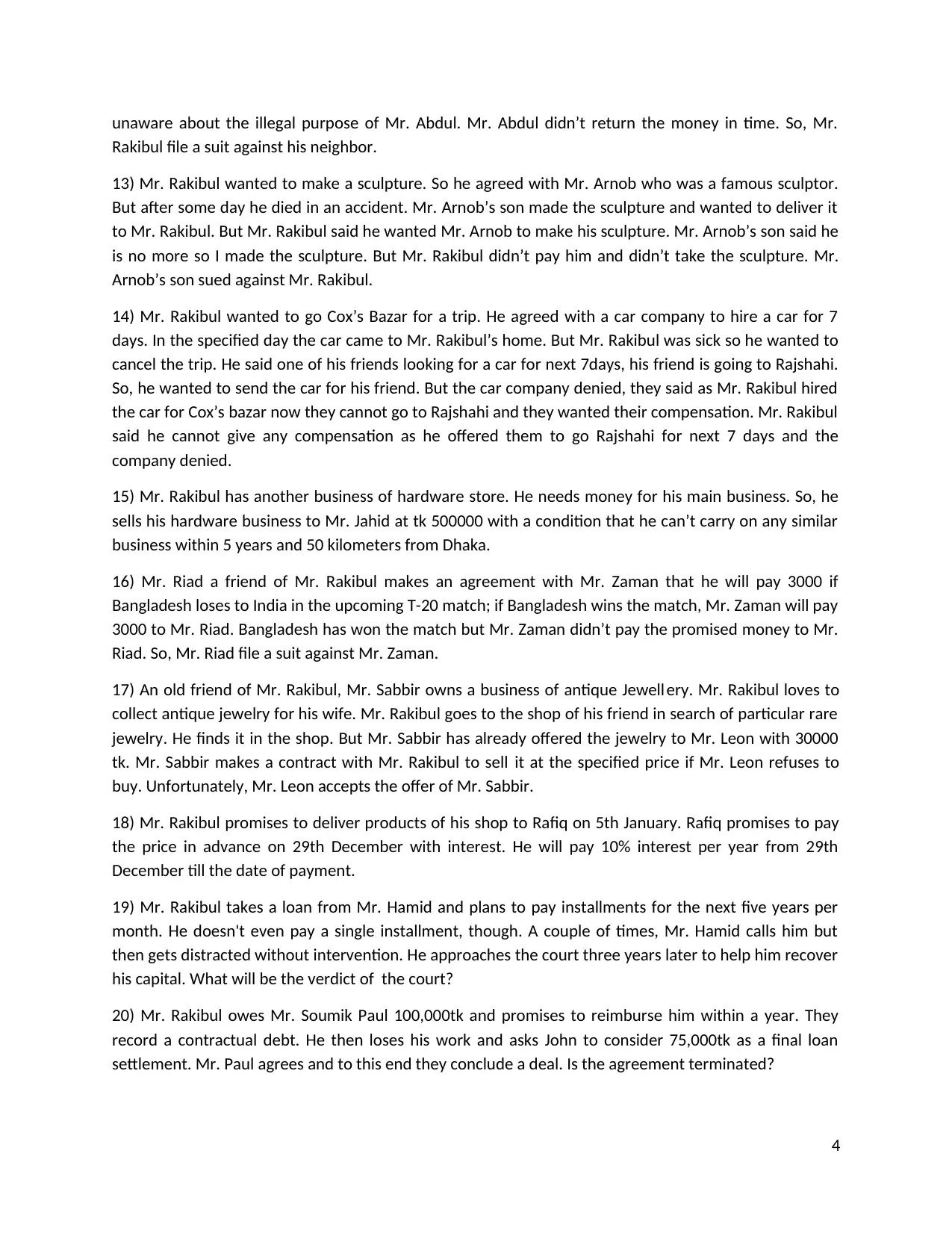
unaware about the illegal purpose of Mr. Abdul. Mr. Abdul didn’t return the money in time. So, Mr.
Rakibul file a suit against his neighbor.
13) Mr. Rakibul wanted to make a sculpture. So he agreed with Mr. Arnob who was a famous sculptor.
But after some day he died in an accident. Mr. Arnob’s son made the sculpture and wanted to deliver it
to Mr. Rakibul. But Mr. Rakibul said he wanted Mr. Arnob to make his sculpture. Mr. Arnob’s son said he
is no more so I made the sculpture. But Mr. Rakibul didn’t pay him and didn’t take the sculpture. Mr.
Arnob’s son sued against Mr. Rakibul.
14) Mr. Rakibul wanted to go Cox’s Bazar for a trip. He agreed with a car company to hire a car for 7
days. In the specified day the car came to Mr. Rakibul’s home. But Mr. Rakibul was sick so he wanted to
cancel the trip. He said one of his friends looking for a car for next 7days, his friend is going to Rajshahi.
So, he wanted to send the car for his friend. But the car company denied, they said as Mr. Rakibul hired
the car for Cox’s bazar now they cannot go to Rajshahi and they wanted their compensation. Mr. Rakibul
said he cannot give any compensation as he offered them to go Rajshahi for next 7 days and the
company denied.
15) Mr. Rakibul has another business of hardware store. He needs money for his main business. So, he
sells his hardware business to Mr. Jahid at tk 500000 with a condition that he can’t carry on any similar
business within 5 years and 50 kilometers from Dhaka.
16) Mr. Riad a friend of Mr. Rakibul makes an agreement with Mr. Zaman that he will pay 3000 if
Bangladesh loses to India in the upcoming T-20 match; if Bangladesh wins the match, Mr. Zaman will pay
3000 to Mr. Riad. Bangladesh has won the match but Mr. Zaman didn’t pay the promised money to Mr.
Riad. So, Mr. Riad file a suit against Mr. Zaman.
17) An old friend of Mr. Rakibul, Mr. Sabbir owns a business of antique Jewell ery. Mr. Rakibul loves to
collect antique jewelry for his wife. Mr. Rakibul goes to the shop of his friend in search of particular rare
jewelry. He finds it in the shop. But Mr. Sabbir has already offered the jewelry to Mr. Leon with 30000
tk. Mr. Sabbir makes a contract with Mr. Rakibul to sell it at the specified price if Mr. Leon refuses to
buy. Unfortunately, Mr. Leon accepts the offer of Mr. Sabbir.
18) Mr. Rakibul promises to deliver products of his shop to Rafiq on 5th January. Rafiq promises to pay
the price in advance on 29th December with interest. He will pay 10% interest per year from 29th
December till the date of payment.
19) Mr. Rakibul takes a loan from Mr. Hamid and plans to pay installments for the next five years per
month. He doesn't even pay a single installment, though. A couple of times, Mr. Hamid calls him but
then gets distracted without intervention. He approaches the court three years later to help him recover
his capital. What will be the verdict of the court?
20) Mr. Rakibul owes Mr. Soumik Paul 100,000tk and promises to reimburse him within a year. They
record a contractual debt. He then loses his work and asks John to consider 75,000tk as a final loan
settlement. Mr. Paul agrees and to this end they conclude a deal. Is the agreement terminated?
4
Rakibul file a suit against his neighbor.
13) Mr. Rakibul wanted to make a sculpture. So he agreed with Mr. Arnob who was a famous sculptor.
But after some day he died in an accident. Mr. Arnob’s son made the sculpture and wanted to deliver it
to Mr. Rakibul. But Mr. Rakibul said he wanted Mr. Arnob to make his sculpture. Mr. Arnob’s son said he
is no more so I made the sculpture. But Mr. Rakibul didn’t pay him and didn’t take the sculpture. Mr.
Arnob’s son sued against Mr. Rakibul.
14) Mr. Rakibul wanted to go Cox’s Bazar for a trip. He agreed with a car company to hire a car for 7
days. In the specified day the car came to Mr. Rakibul’s home. But Mr. Rakibul was sick so he wanted to
cancel the trip. He said one of his friends looking for a car for next 7days, his friend is going to Rajshahi.
So, he wanted to send the car for his friend. But the car company denied, they said as Mr. Rakibul hired
the car for Cox’s bazar now they cannot go to Rajshahi and they wanted their compensation. Mr. Rakibul
said he cannot give any compensation as he offered them to go Rajshahi for next 7 days and the
company denied.
15) Mr. Rakibul has another business of hardware store. He needs money for his main business. So, he
sells his hardware business to Mr. Jahid at tk 500000 with a condition that he can’t carry on any similar
business within 5 years and 50 kilometers from Dhaka.
16) Mr. Riad a friend of Mr. Rakibul makes an agreement with Mr. Zaman that he will pay 3000 if
Bangladesh loses to India in the upcoming T-20 match; if Bangladesh wins the match, Mr. Zaman will pay
3000 to Mr. Riad. Bangladesh has won the match but Mr. Zaman didn’t pay the promised money to Mr.
Riad. So, Mr. Riad file a suit against Mr. Zaman.
17) An old friend of Mr. Rakibul, Mr. Sabbir owns a business of antique Jewell ery. Mr. Rakibul loves to
collect antique jewelry for his wife. Mr. Rakibul goes to the shop of his friend in search of particular rare
jewelry. He finds it in the shop. But Mr. Sabbir has already offered the jewelry to Mr. Leon with 30000
tk. Mr. Sabbir makes a contract with Mr. Rakibul to sell it at the specified price if Mr. Leon refuses to
buy. Unfortunately, Mr. Leon accepts the offer of Mr. Sabbir.
18) Mr. Rakibul promises to deliver products of his shop to Rafiq on 5th January. Rafiq promises to pay
the price in advance on 29th December with interest. He will pay 10% interest per year from 29th
December till the date of payment.
19) Mr. Rakibul takes a loan from Mr. Hamid and plans to pay installments for the next five years per
month. He doesn't even pay a single installment, though. A couple of times, Mr. Hamid calls him but
then gets distracted without intervention. He approaches the court three years later to help him recover
his capital. What will be the verdict of the court?
20) Mr. Rakibul owes Mr. Soumik Paul 100,000tk and promises to reimburse him within a year. They
record a contractual debt. He then loses his work and asks John to consider 75,000tk as a final loan
settlement. Mr. Paul agrees and to this end they conclude a deal. Is the agreement terminated?
4
⊘ This is a preview!⊘
Do you want full access?
Subscribe today to unlock all pages.

Trusted by 1+ million students worldwide
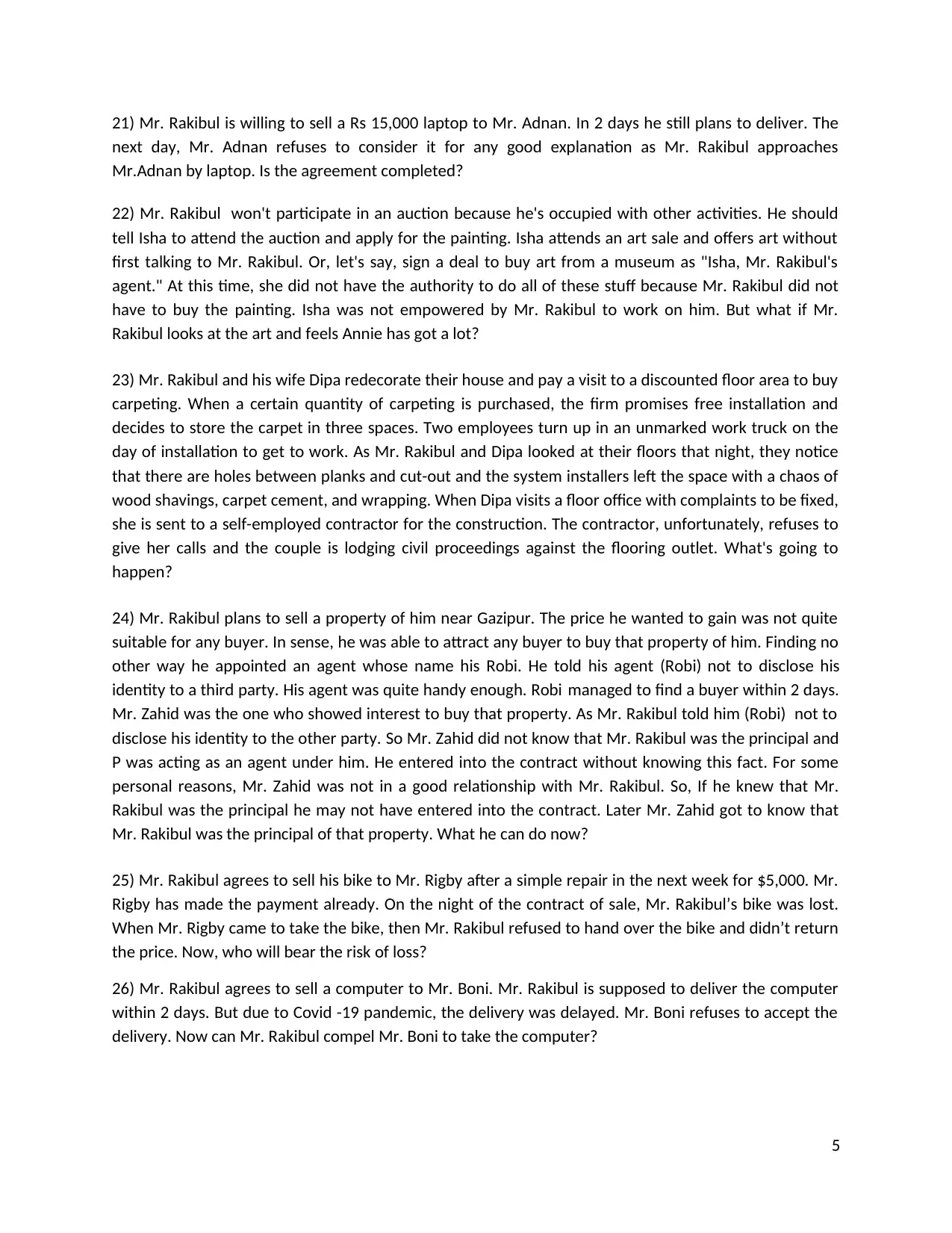
21) Mr. Rakibul is willing to sell a Rs 15,000 laptop to Mr. Adnan. In 2 days he still plans to deliver. The
next day, Mr. Adnan refuses to consider it for any good explanation as Mr. Rakibul approaches
Mr.Adnan by laptop. Is the agreement completed?
22) Mr. Rakibul won't participate in an auction because he's occupied with other activities. He should
tell Isha to attend the auction and apply for the painting. Isha attends an art sale and offers art without
first talking to Mr. Rakibul. Or, let's say, sign a deal to buy art from a museum as "Isha, Mr. Rakibul's
agent." At this time, she did not have the authority to do all of these stuff because Mr. Rakibul did not
have to buy the painting. Isha was not empowered by Mr. Rakibul to work on him. But what if Mr.
Rakibul looks at the art and feels Annie has got a lot?
23) Mr. Rakibul and his wife Dipa redecorate their house and pay a visit to a discounted floor area to buy
carpeting. When a certain quantity of carpeting is purchased, the firm promises free installation and
decides to store the carpet in three spaces. Two employees turn up in an unmarked work truck on the
day of installation to get to work. As Mr. Rakibul and Dipa looked at their floors that night, they notice
that there are holes between planks and cut-out and the system installers left the space with a chaos of
wood shavings, carpet cement, and wrapping. When Dipa visits a floor office with complaints to be fixed,
she is sent to a self-employed contractor for the construction. The contractor, unfortunately, refuses to
give her calls and the couple is lodging civil proceedings against the flooring outlet. What's going to
happen?
24) Mr. Rakibul plans to sell a property of him near Gazipur. The price he wanted to gain was not quite
suitable for any buyer. In sense, he was able to attract any buyer to buy that property of him. Finding no
other way he appointed an agent whose name his Robi. He told his agent (Robi) not to disclose his
identity to a third party. His agent was quite handy enough. Robi managed to find a buyer within 2 days.
Mr. Zahid was the one who showed interest to buy that property. As Mr. Rakibul told him (Robi) not to
disclose his identity to the other party. So Mr. Zahid did not know that Mr. Rakibul was the principal and
P was acting as an agent under him. He entered into the contract without knowing this fact. For some
personal reasons, Mr. Zahid was not in a good relationship with Mr. Rakibul. So, If he knew that Mr.
Rakibul was the principal he may not have entered into the contract. Later Mr. Zahid got to know that
Mr. Rakibul was the principal of that property. What he can do now?
25) Mr. Rakibul agrees to sell his bike to Mr. Rigby after a simple repair in the next week for $5,000. Mr.
Rigby has made the payment already. On the night of the contract of sale, Mr. Rakibul’s bike was lost.
When Mr. Rigby came to take the bike, then Mr. Rakibul refused to hand over the bike and didn’t return
the price. Now, who will bear the risk of loss?
26) Mr. Rakibul agrees to sell a computer to Mr. Boni. Mr. Rakibul is supposed to deliver the computer
within 2 days. But due to Covid -19 pandemic, the delivery was delayed. Mr. Boni refuses to accept the
delivery. Now can Mr. Rakibul compel Mr. Boni to take the computer?
5
next day, Mr. Adnan refuses to consider it for any good explanation as Mr. Rakibul approaches
Mr.Adnan by laptop. Is the agreement completed?
22) Mr. Rakibul won't participate in an auction because he's occupied with other activities. He should
tell Isha to attend the auction and apply for the painting. Isha attends an art sale and offers art without
first talking to Mr. Rakibul. Or, let's say, sign a deal to buy art from a museum as "Isha, Mr. Rakibul's
agent." At this time, she did not have the authority to do all of these stuff because Mr. Rakibul did not
have to buy the painting. Isha was not empowered by Mr. Rakibul to work on him. But what if Mr.
Rakibul looks at the art and feels Annie has got a lot?
23) Mr. Rakibul and his wife Dipa redecorate their house and pay a visit to a discounted floor area to buy
carpeting. When a certain quantity of carpeting is purchased, the firm promises free installation and
decides to store the carpet in three spaces. Two employees turn up in an unmarked work truck on the
day of installation to get to work. As Mr. Rakibul and Dipa looked at their floors that night, they notice
that there are holes between planks and cut-out and the system installers left the space with a chaos of
wood shavings, carpet cement, and wrapping. When Dipa visits a floor office with complaints to be fixed,
she is sent to a self-employed contractor for the construction. The contractor, unfortunately, refuses to
give her calls and the couple is lodging civil proceedings against the flooring outlet. What's going to
happen?
24) Mr. Rakibul plans to sell a property of him near Gazipur. The price he wanted to gain was not quite
suitable for any buyer. In sense, he was able to attract any buyer to buy that property of him. Finding no
other way he appointed an agent whose name his Robi. He told his agent (Robi) not to disclose his
identity to a third party. His agent was quite handy enough. Robi managed to find a buyer within 2 days.
Mr. Zahid was the one who showed interest to buy that property. As Mr. Rakibul told him (Robi) not to
disclose his identity to the other party. So Mr. Zahid did not know that Mr. Rakibul was the principal and
P was acting as an agent under him. He entered into the contract without knowing this fact. For some
personal reasons, Mr. Zahid was not in a good relationship with Mr. Rakibul. So, If he knew that Mr.
Rakibul was the principal he may not have entered into the contract. Later Mr. Zahid got to know that
Mr. Rakibul was the principal of that property. What he can do now?
25) Mr. Rakibul agrees to sell his bike to Mr. Rigby after a simple repair in the next week for $5,000. Mr.
Rigby has made the payment already. On the night of the contract of sale, Mr. Rakibul’s bike was lost.
When Mr. Rigby came to take the bike, then Mr. Rakibul refused to hand over the bike and didn’t return
the price. Now, who will bear the risk of loss?
26) Mr. Rakibul agrees to sell a computer to Mr. Boni. Mr. Rakibul is supposed to deliver the computer
within 2 days. But due to Covid -19 pandemic, the delivery was delayed. Mr. Boni refuses to accept the
delivery. Now can Mr. Rakibul compel Mr. Boni to take the computer?
5
Paraphrase This Document
Need a fresh take? Get an instant paraphrase of this document with our AI Paraphraser
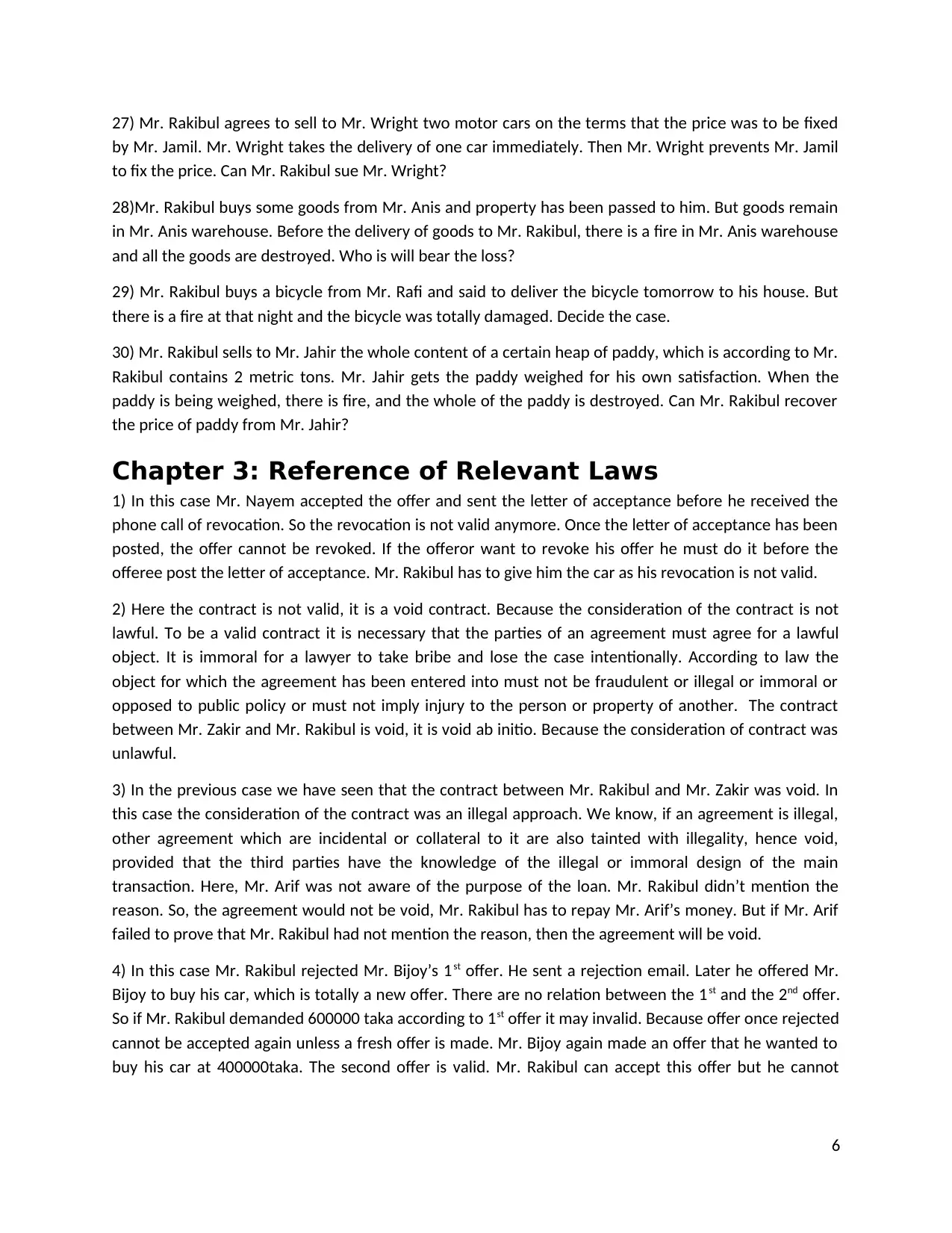
27) Mr. Rakibul agrees to sell to Mr. Wright two motor cars on the terms that the price was to be fixed
by Mr. Jamil. Mr. Wright takes the delivery of one car immediately. Then Mr. Wright prevents Mr. Jamil
to fix the price. Can Mr. Rakibul sue Mr. Wright?
28)Mr. Rakibul buys some goods from Mr. Anis and property has been passed to him. But goods remain
in Mr. Anis warehouse. Before the delivery of goods to Mr. Rakibul, there is a fire in Mr. Anis warehouse
and all the goods are destroyed. Who is will bear the loss?
29) Mr. Rakibul buys a bicycle from Mr. Rafi and said to deliver the bicycle tomorrow to his house. But
there is a fire at that night and the bicycle was totally damaged. Decide the case.
30) Mr. Rakibul sells to Mr. Jahir the whole content of a certain heap of paddy, which is according to Mr.
Rakibul contains 2 metric tons. Mr. Jahir gets the paddy weighed for his own satisfaction. When the
paddy is being weighed, there is fire, and the whole of the paddy is destroyed. Can Mr. Rakibul recover
the price of paddy from Mr. Jahir?
Chapter 3: Reference of Relevant Laws
1) In this case Mr. Nayem accepted the offer and sent the letter of acceptance before he received the
phone call of revocation. So the revocation is not valid anymore. Once the letter of acceptance has been
posted, the offer cannot be revoked. If the offeror want to revoke his offer he must do it before the
offeree post the letter of acceptance. Mr. Rakibul has to give him the car as his revocation is not valid.
2) Here the contract is not valid, it is a void contract. Because the consideration of the contract is not
lawful. To be a valid contract it is necessary that the parties of an agreement must agree for a lawful
object. It is immoral for a lawyer to take bribe and lose the case intentionally. According to law the
object for which the agreement has been entered into must not be fraudulent or illegal or immoral or
opposed to public policy or must not imply injury to the person or property of another. The contract
between Mr. Zakir and Mr. Rakibul is void, it is void ab initio. Because the consideration of contract was
unlawful.
3) In the previous case we have seen that the contract between Mr. Rakibul and Mr. Zakir was void. In
this case the consideration of the contract was an illegal approach. We know, if an agreement is illegal,
other agreement which are incidental or collateral to it are also tainted with illegality, hence void,
provided that the third parties have the knowledge of the illegal or immoral design of the main
transaction. Here, Mr. Arif was not aware of the purpose of the loan. Mr. Rakibul didn’t mention the
reason. So, the agreement would not be void, Mr. Rakibul has to repay Mr. Arif’s money. But if Mr. Arif
failed to prove that Mr. Rakibul had not mention the reason, then the agreement will be void.
4) In this case Mr. Rakibul rejected Mr. Bijoy’s 1st offer. He sent a rejection email. Later he offered Mr.
Bijoy to buy his car, which is totally a new offer. There are no relation between the 1st and the 2nd offer.
So if Mr. Rakibul demanded 600000 taka according to 1st offer it may invalid. Because offer once rejected
cannot be accepted again unless a fresh offer is made. Mr. Bijoy again made an offer that he wanted to
buy his car at 400000taka. The second offer is valid. Mr. Rakibul can accept this offer but he cannot
6
by Mr. Jamil. Mr. Wright takes the delivery of one car immediately. Then Mr. Wright prevents Mr. Jamil
to fix the price. Can Mr. Rakibul sue Mr. Wright?
28)Mr. Rakibul buys some goods from Mr. Anis and property has been passed to him. But goods remain
in Mr. Anis warehouse. Before the delivery of goods to Mr. Rakibul, there is a fire in Mr. Anis warehouse
and all the goods are destroyed. Who is will bear the loss?
29) Mr. Rakibul buys a bicycle from Mr. Rafi and said to deliver the bicycle tomorrow to his house. But
there is a fire at that night and the bicycle was totally damaged. Decide the case.
30) Mr. Rakibul sells to Mr. Jahir the whole content of a certain heap of paddy, which is according to Mr.
Rakibul contains 2 metric tons. Mr. Jahir gets the paddy weighed for his own satisfaction. When the
paddy is being weighed, there is fire, and the whole of the paddy is destroyed. Can Mr. Rakibul recover
the price of paddy from Mr. Jahir?
Chapter 3: Reference of Relevant Laws
1) In this case Mr. Nayem accepted the offer and sent the letter of acceptance before he received the
phone call of revocation. So the revocation is not valid anymore. Once the letter of acceptance has been
posted, the offer cannot be revoked. If the offeror want to revoke his offer he must do it before the
offeree post the letter of acceptance. Mr. Rakibul has to give him the car as his revocation is not valid.
2) Here the contract is not valid, it is a void contract. Because the consideration of the contract is not
lawful. To be a valid contract it is necessary that the parties of an agreement must agree for a lawful
object. It is immoral for a lawyer to take bribe and lose the case intentionally. According to law the
object for which the agreement has been entered into must not be fraudulent or illegal or immoral or
opposed to public policy or must not imply injury to the person or property of another. The contract
between Mr. Zakir and Mr. Rakibul is void, it is void ab initio. Because the consideration of contract was
unlawful.
3) In the previous case we have seen that the contract between Mr. Rakibul and Mr. Zakir was void. In
this case the consideration of the contract was an illegal approach. We know, if an agreement is illegal,
other agreement which are incidental or collateral to it are also tainted with illegality, hence void,
provided that the third parties have the knowledge of the illegal or immoral design of the main
transaction. Here, Mr. Arif was not aware of the purpose of the loan. Mr. Rakibul didn’t mention the
reason. So, the agreement would not be void, Mr. Rakibul has to repay Mr. Arif’s money. But if Mr. Arif
failed to prove that Mr. Rakibul had not mention the reason, then the agreement will be void.
4) In this case Mr. Rakibul rejected Mr. Bijoy’s 1st offer. He sent a rejection email. Later he offered Mr.
Bijoy to buy his car, which is totally a new offer. There are no relation between the 1st and the 2nd offer.
So if Mr. Rakibul demanded 600000 taka according to 1st offer it may invalid. Because offer once rejected
cannot be accepted again unless a fresh offer is made. Mr. Bijoy again made an offer that he wanted to
buy his car at 400000taka. The second offer is valid. Mr. Rakibul can accept this offer but he cannot
6
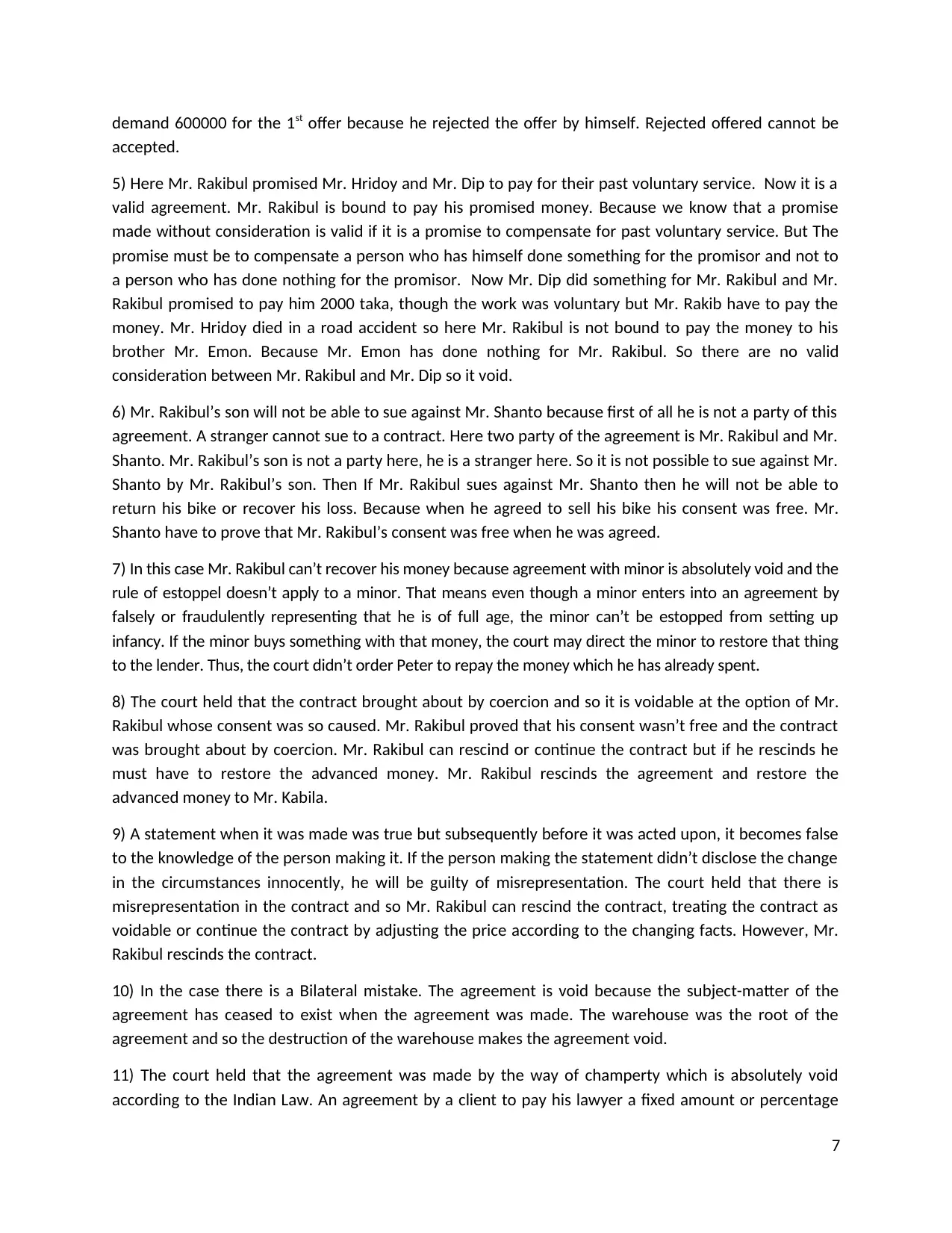
demand 600000 for the 1st offer because he rejected the offer by himself. Rejected offered cannot be
accepted.
5) Here Mr. Rakibul promised Mr. Hridoy and Mr. Dip to pay for their past voluntary service. Now it is a
valid agreement. Mr. Rakibul is bound to pay his promised money. Because we know that a promise
made without consideration is valid if it is a promise to compensate for past voluntary service. But The
promise must be to compensate a person who has himself done something for the promisor and not to
a person who has done nothing for the promisor. Now Mr. Dip did something for Mr. Rakibul and Mr.
Rakibul promised to pay him 2000 taka, though the work was voluntary but Mr. Rakib have to pay the
money. Mr. Hridoy died in a road accident so here Mr. Rakibul is not bound to pay the money to his
brother Mr. Emon. Because Mr. Emon has done nothing for Mr. Rakibul. So there are no valid
consideration between Mr. Rakibul and Mr. Dip so it void.
6) Mr. Rakibul’s son will not be able to sue against Mr. Shanto because first of all he is not a party of this
agreement. A stranger cannot sue to a contract. Here two party of the agreement is Mr. Rakibul and Mr.
Shanto. Mr. Rakibul’s son is not a party here, he is a stranger here. So it is not possible to sue against Mr.
Shanto by Mr. Rakibul’s son. Then If Mr. Rakibul sues against Mr. Shanto then he will not be able to
return his bike or recover his loss. Because when he agreed to sell his bike his consent was free. Mr.
Shanto have to prove that Mr. Rakibul’s consent was free when he was agreed.
7) In this case Mr. Rakibul can’t recover his money because agreement with minor is absolutely void and the
rule of estoppel doesn’t apply to a minor. That means even though a minor enters into an agreement by
falsely or fraudulently representing that he is of full age, the minor can’t be estopped from setting up
infancy. If the minor buys something with that money, the court may direct the minor to restore that thing
to the lender. Thus, the court didn’t order Peter to repay the money which he has already spent.
8) The court held that the contract brought about by coercion and so it is voidable at the option of Mr.
Rakibul whose consent was so caused. Mr. Rakibul proved that his consent wasn’t free and the contract
was brought about by coercion. Mr. Rakibul can rescind or continue the contract but if he rescinds he
must have to restore the advanced money. Mr. Rakibul rescinds the agreement and restore the
advanced money to Mr. Kabila.
9) A statement when it was made was true but subsequently before it was acted upon, it becomes false
to the knowledge of the person making it. If the person making the statement didn’t disclose the change
in the circumstances innocently, he will be guilty of misrepresentation. The court held that there is
misrepresentation in the contract and so Mr. Rakibul can rescind the contract, treating the contract as
voidable or continue the contract by adjusting the price according to the changing facts. However, Mr.
Rakibul rescinds the contract.
10) In the case there is a Bilateral mistake. The agreement is void because the subject-matter of the
agreement has ceased to exist when the agreement was made. The warehouse was the root of the
agreement and so the destruction of the warehouse makes the agreement void.
11) The court held that the agreement was made by the way of champerty which is absolutely void
according to the Indian Law. An agreement by a client to pay his lawyer a fixed amount or percentage
7
accepted.
5) Here Mr. Rakibul promised Mr. Hridoy and Mr. Dip to pay for their past voluntary service. Now it is a
valid agreement. Mr. Rakibul is bound to pay his promised money. Because we know that a promise
made without consideration is valid if it is a promise to compensate for past voluntary service. But The
promise must be to compensate a person who has himself done something for the promisor and not to
a person who has done nothing for the promisor. Now Mr. Dip did something for Mr. Rakibul and Mr.
Rakibul promised to pay him 2000 taka, though the work was voluntary but Mr. Rakib have to pay the
money. Mr. Hridoy died in a road accident so here Mr. Rakibul is not bound to pay the money to his
brother Mr. Emon. Because Mr. Emon has done nothing for Mr. Rakibul. So there are no valid
consideration between Mr. Rakibul and Mr. Dip so it void.
6) Mr. Rakibul’s son will not be able to sue against Mr. Shanto because first of all he is not a party of this
agreement. A stranger cannot sue to a contract. Here two party of the agreement is Mr. Rakibul and Mr.
Shanto. Mr. Rakibul’s son is not a party here, he is a stranger here. So it is not possible to sue against Mr.
Shanto by Mr. Rakibul’s son. Then If Mr. Rakibul sues against Mr. Shanto then he will not be able to
return his bike or recover his loss. Because when he agreed to sell his bike his consent was free. Mr.
Shanto have to prove that Mr. Rakibul’s consent was free when he was agreed.
7) In this case Mr. Rakibul can’t recover his money because agreement with minor is absolutely void and the
rule of estoppel doesn’t apply to a minor. That means even though a minor enters into an agreement by
falsely or fraudulently representing that he is of full age, the minor can’t be estopped from setting up
infancy. If the minor buys something with that money, the court may direct the minor to restore that thing
to the lender. Thus, the court didn’t order Peter to repay the money which he has already spent.
8) The court held that the contract brought about by coercion and so it is voidable at the option of Mr.
Rakibul whose consent was so caused. Mr. Rakibul proved that his consent wasn’t free and the contract
was brought about by coercion. Mr. Rakibul can rescind or continue the contract but if he rescinds he
must have to restore the advanced money. Mr. Rakibul rescinds the agreement and restore the
advanced money to Mr. Kabila.
9) A statement when it was made was true but subsequently before it was acted upon, it becomes false
to the knowledge of the person making it. If the person making the statement didn’t disclose the change
in the circumstances innocently, he will be guilty of misrepresentation. The court held that there is
misrepresentation in the contract and so Mr. Rakibul can rescind the contract, treating the contract as
voidable or continue the contract by adjusting the price according to the changing facts. However, Mr.
Rakibul rescinds the contract.
10) In the case there is a Bilateral mistake. The agreement is void because the subject-matter of the
agreement has ceased to exist when the agreement was made. The warehouse was the root of the
agreement and so the destruction of the warehouse makes the agreement void.
11) The court held that the agreement was made by the way of champerty which is absolutely void
according to the Indian Law. An agreement by a client to pay his lawyer a fixed amount or percentage
7
⊘ This is a preview!⊘
Do you want full access?
Subscribe today to unlock all pages.

Trusted by 1+ million students worldwide
1 out of 18